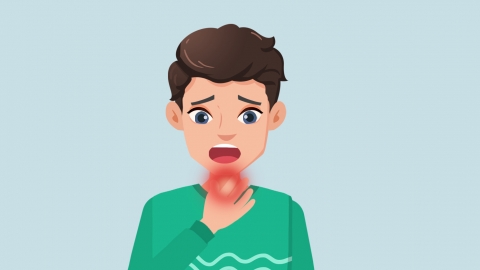What causes stomach qi rising upward, throat blockage, and chest tightness, and what should be done?
Under normal circumstances, upward rebellion of stomach qi, throat blockage, and chest tightness may be caused by improper diet, emotional factors, gastroesophageal reflux disease (GERD), chronic gastritis, or functional dyspepsia. Treatment can be administered under a doctor's guidance through general approaches or medication. If symptoms worsen or persist, timely medical consultation at a hospital is recommended. Detailed explanations are as follows:

1. Improper Diet
Eating too much or too quickly, consuming gas-producing foods, or binge eating can cause excessive gas accumulation in the stomach, increasing internal pressure and leading to upward movement of stomach qi. Simultaneously, gastric contents may reflux into the esophagus, irritating the esophageal mucosa and throat, causing a sensation of throat blockage. Severe cases may be accompanied by chest discomfort. It is recommended to develop good eating habits: chew food thoroughly, eat slowly, avoid overeating, reduce intake of gas-producing foods, maintain regular meal times, and eat in moderate portions.
2. Emotional Factors
When the body is in a state of anxiety, tension, or depression, autonomic nervous system function may be affected, leading to gastrointestinal motility and emptying disorders. This prevents stomach qi from descending normally and instead causes it to rise upward. Additionally, emotional fluctuations may cause chest muscle tension, intensifying the feeling of chest tightness, and possibly triggering enhanced throat discomfort via neural reflexes. Learning to regulate emotions through appropriate exercise, meditation, deep breathing exercises, and stress reduction techniques can help maintain emotional well-being and avoid prolonged mental tension.
3. Gastroesophageal Reflux Disease (GERD)
GERD is typically caused by dysfunction of the lower esophageal sphincter, reduced esophageal clearance, delayed gastric emptying, or impaired esophageal mucosal barrier function. Stomach acid and gastric contents reflux into the esophagus, irritating the esophageal mucosa and causing symptoms such as heartburn and acid regurgitation. The refluxate may further reach the throat, irritating the throat mucosa and causing a sensation of throat blockage. Symptoms may also include chest tightness and chest pain. Treatment may include medications such as omeprazole enteric-coated capsules, lansoprazole enteric-coated tablets, and rabeprazole sodium enteric-coated tablets, as directed by a physician.
4. Chronic Gastritis
Chronic gastritis is mainly caused by Helicobacter pylori infection, dietary factors, medication use, or autoimmune conditions. Damage to the gastric mucosa weakens digestive function, causing food to remain longer in the stomach, fermenting and producing gas, which leads to upward movement of stomach qi. Inflammatory stimulation may cause chest discomfort via neural reflexes, and gastric reflux may irritate the esophagus and throat, resulting in throat blockage and chest tightness. Symptoms may also include dull upper abdominal pain, bloating, and belching. Treatment may involve medications such as trimebutine maleate tablets, colloidal bismuth subcitrate capsules, and amoxicillin capsules, as directed by a doctor.
5. Functional Dyspepsia
Functional dyspepsia may be related to gastrointestinal motility disorders, visceral hypersensitivity, reduced receptive relaxation of the gastric fundus, or psychological factors. Abnormal gastrointestinal motility causes delayed gastric emptying, prolonged food retention in the stomach, fermentation, and gas production, leading to upward movement of stomach qi. Patients often experience visceral hypersensitivity, with abnormal perception of normal gastrointestinal distension and contraction, resulting in discomfort in the chest and throat areas, manifesting as throat blockage and chest tightness. Symptoms may also include loss of appetite and nausea. Treatment options may include mosapride citrate tablets, domperidone tablets, and compound digestive enzyme capsules, as prescribed by a physician.
In daily life, maintaining a regular routine, avoiding late nights, and allowing sufficient rest time for the gastrointestinal tract are recommended.







